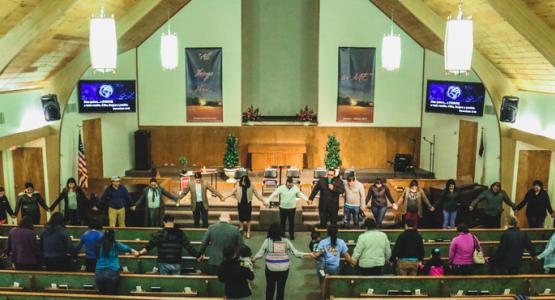
In recent months, newly proposed United States immigration policies have caused a wave of fear among many Seventh-day Adventist church members and their families across the Columbia Union Conference, or church region. Many are so afraid that they have decided to skip church.
“During those first few weeks after [the US] election, I noticed a large decline in attendance among my members,” said a pastor of a Spanish-speaking congregation in the Washington D.C. area. “They stayed home out of fear.”
Peter Simpson, Hispanic Ministries coordinator in Ohio, said he has seen a decline in attendance in churches across the territory. “We have seen many members living in fear, even opting to stay home in fear of getting arrested by US Immigration and Customs Enforcement on their way to or from church,” he said. “Attendance has declined significantly.”
![A group of church members pray together after taking part in a workshop to learn more about their rights and options as immigrants. [Photo by Daniel Perla]](https://adventistreview.org/wp-content/uploads/2022/01/immigrant_article._feature._by_hector_perla.jpg)
Simpson shared that two families from a small Spanish-speaking church have already packed up and returned to their home country. “[They were a] significant part of that church,” he said. “And there are talks of other families in the conference planning to do the same.”
One principal of a Seventh-day Adventist school in Virginia reports that undocumented parents approached her, asking if the school would hold a notarized note saying who their children should stay with if they were deported.
Creating Peace and Hope
Rubén Ramos, vice president for Multilingual Ministries at the Columbia Union Conference, reported that there are more than 40,000 members in multilingual churches in the union. “They're providing an essential contribution to Christ´s mission in our territory,” he said. “A real sense of uncertainty and fear has filled the immigrant communities around us.” Ramos said that this is a great opportunity for the church to bring assurance and faith, transforming Adventist congregations into centers of hope.
Pastors across the union are working to create a sense of peace and hope among their congregations. Orlando Rosales, pastor of the Baltimore Spanish church, says a main goal of his ministry is to communicate God’s protection. “We want [members] to find hope in God’s hands,” he said.
Simpson and other pastors said they have been emphasizing God’s protection and hope through their sermons in recent months. “As time goes by, we are seeing that they are starting to calm down and attend church again,” said one Hispanic pastor.
“I would love to see the Adventist Church in general be more involved as an advocate for immigrants.”
Hispanic churches are also organizing workshops with immigration lawyers who provide counsel and instruction on how to handle an encounter with immigration officers. Katherine Canto, an immigration lawyer from Towson, Maryland, and a member of the Baltimore Spanish church, recently held an immigration workshop for her congregation. Canto, too, has noticed a sense of fear in the church and community at large. “The current situation has either caused people to go deeper into hiding or to move into action and work on their immigration status.”
Many lay members have also been ignited with a sense of urgency to minister to those affected by the new policies. Anissa Perez-Perla, Personal Ministries director at Arise Church in Silver Spring, Maryland, and founder of DC Adventists for Social Action, organized a “Know Your Rights” workshop and prayer event at the Washington Spanish church in February. Perez-Perla recruited three area pastors to assist her in planning the event, which drew both church and community members.
“Fear and uncertainty have increased among the immigrant community, both in our pews and in the streets,” said Perez-Perla. “I know people who have packed their bags just in case they get sent back to their birthplace, which sometimes is a place they know nothing about since they were raised in the United States.” Perez-Perla said that their goal is to allay immigration-related fears and at the same time educate and empower the Latino community.
While these workshops at churches are helpful and necessary, Perez-Perla believes more could be done. “I would love to see the Adventist Church in general be more involved as an advocate for immigrants,” she said.